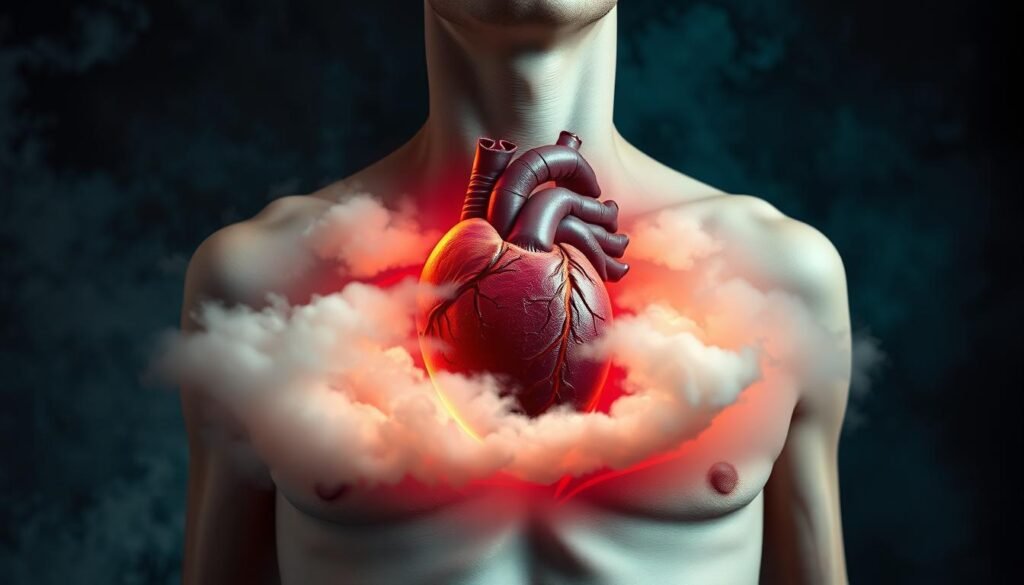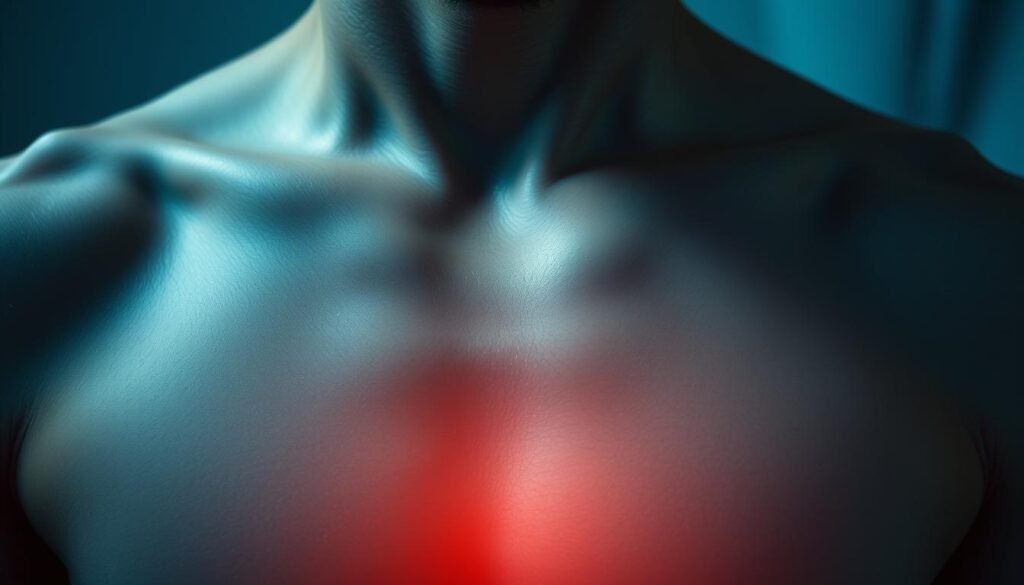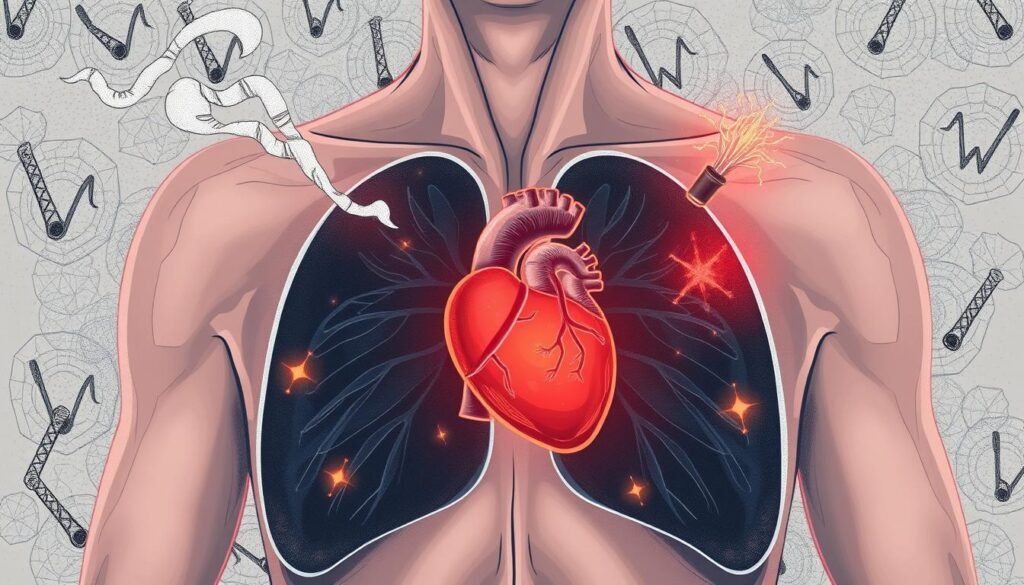Have you ever felt chest pain during a moment of anxiety? This pain often sends people straight to the hospital. It’s vital to understand the connection between anxiety and chest pain. Surprisingly, 25 to 50 percent of patients with low-risk chest pain also report moderate to severe anxiety. This raises an important question: is anxiety the direct cause of chest pain, or is something else to blame?
Understanding the link between anxiety and chest pain is key. Nearly 30 percent of heart attack patients don’t have chest pain. This suggests not all chest pains are heart-related. People with panic disorders also often feel chest pain. It shows how important it is to know the difference between anxiety chest symptoms and serious heart issues. Always get medical help for any worrying symptoms.
If you want to learn more about anxiety disorders and their emotional effects, you might find this article very helpful.
Key Takeaways
- Anxiety can lead to chest pain, commonly causing alarm.
- 25 to 50 percent of low-risk chest pain patients experience anxiety.
- 30 percent of heart attack patients may not display chest pain.
- Panic disorder affects 1-4 out of every 100 people.
- Chest pain is experienced in 20% to 70% of panic attacks.
Understanding Anxiety and Its Effects
Anxiety acts as a natural alarm when we sense danger. It turns on our body’s fight-or-flight response. This reaction can cause physical symptoms like chest pains from anxiety disorders. It’s crucial for people with anxiety to recognize these signs. Knowing what triggers your anxiety helps in managing it better.
What Is Anxiety?
Anxiety isn’t just about feeling stressed out. It includes various disorders marked by too much worry and fear. Roughly 30% of adults might face an anxiety disorder in their lives. These issues often lead to symptoms like an increased heart rate and stomach problems. Furthermore, chest pain is a common sign in disorders like Generalized Anxiety Disorder (GAD) and Panic Disorder.
Common Triggers of Anxiety
Many things can set off anxiety, from big life changes to daily pressures. Job interviews, issues in relationships, and money worries are typical triggers. Also, drinking too much caffeine can make anxiety worse. To learn how to handle anxiety and its impact, particularly chest pain, checking out helpful resources is a good idea.
Understanding what triggers your anxiety is a key step in finding the right help and support. Effectively dealing with anxiety not only reduces chest pains linked to anxiety disorders. It also improves your overall health and happiness.
Does Anxiety Cause Chest Pain?
Many people wonder, does anxiety cause chest pain? Anxiety and chest pain are closely linked, especially for those without heart issues. It’s important to understand this to find anxiety chest pain relief.
Link Between Anxiety and Chest Pain
Anxiety can cause our bodies to stress out. This leads to more adrenaline and cortisol, making our hearts beat faster. This can feel like chest pain. Around 30% to 40% of chest pains in emergency rooms are linked to anxiety.
This pain can feel sudden and sharp, especially on the chest’s left side. Unlike a heart attack that happens during exercise, pain from anxiety stops in a few minutes.
Statistics on Anxiety-Induced Chest Pain
About 58% of chest pain not linked to heart problems comes from anxiety. These symptoms start quickly but don’t last long, unlike heart pain. Heart pain can move to the shoulder or arm, but anxiety pain stays in one place.
Using relaxation techniques and therapy helps manage this type of chest pain.

Physical Symptoms of Anxiety
It’s vital to know the physical signs of anxiety for those who often feel anxious. Anxiety can show up in many ways, causing discomfort that may look like other health issues. Knowing the key symptoms of anxiety helps manage and respond to these episodes better.
Key Symptoms Associated with Anxiety
The body’s fight or flight response often triggers anxiety’s physical signs. Some common symptoms are:
- Chest tightness anxiety
- Rapid heart rate
- Shortness of breath
- Sweating and trembling
- Muscle tension
- Dizziness or lightheadedness
Chest pain from anxiety is usually due to muscle tension. This can feel concerning, but know it’s not always a major health issue. Getting help from services like personalized anxiety care can greatly help in managing these symptoms.
Differences between Anxiety Symptoms and Other Conditions
Telling the difference between anxiety symptoms and other health issues is crucial. Though anxiety can cause physical symptoms, similar signs might suggest different conditions. Knowing the differences between anxiety symptoms and other conditions reduces unnecessary worry and doctor visits. For example:
| Symptom | Associated with Anxiety | Associated with Cardiac Issues |
|---|---|---|
| Chest Pain | Often due to muscle tension | May indicate a heart attack |
| Shortness of Breath | Rapid, shallow breathing | Can indicate heart-related problems |
| Fast Heart Rate | Common with anxiety events | Possible sign of heart distress |
| Dizziness | Related to anxiety episodes | Can suggest cardiac issues |
Seeing a healthcare professional for symptoms like chest pain ensures you get the right diagnosis. Understanding anxiety more deeply can improve life quality for those affected.

Anxiety Chest Symptoms: What to Look For
It’s vital to know the signs of anxiety chest symptoms. They can appear in many ways, which sometimes causes confusion. It’s important to clearly understand these symptoms.
Common Descriptions of Anxiety-Related Chest Pain
People describe anxiety-related chest pain in different ways. Here are some common descriptions of anxiety-related chest pain:
- Sharp or stabbing pain
- Dull ache or pressure
- Tightness or tension
- Burning sensations
- Numbness in the chest area
The way these symptoms show up can make it hard to tell them apart from heart problems. Often, anxious chest pains happen when someone is resting or stressed, not when moving around.
How Anxiety Symptoms Vary from Person to Person
Anxiety affects everyone differently. This means people have a wide range of anxiety chest symptoms. Things like how much stress you’re under, how you cope, and your mental health matter a lot. Some people get severe panic attacks. During these, they might feel chest pain along with:
- Increased heart rate
- Breathlessness or shortness of breath
- Dizziness or lightheadedness
Since symptoms can differ so much, it’s key to know your own and get a professional opinion if you feel chest pain. Getting help can give you the support and info you need. This includes tackling anxiety and checking for other health issues.

How Anxiety Causes Chest Pain
Anxiety affects the body, especially with stress and emotional trouble. The fight-or-flight response gets activated during anxiety episodes. It gets the body ready to face or flee from threats. This causes a surge in hormones like adrenaline and cortisol. These hormones impact many body functions, including the heart.
The Fight-or-Flight Response
Anxiety triggers the fight-or-flight response, leading to body changes. The heart rate goes up and blood pressure rises. These changes prepare the body for action. But, for those with chronic anxiety, this happens often. It increases their risk of long-term health problems.
Role of Adrenaline and Cortisol
Adrenaline and cortisol play big roles in anxiety and heart health. They can cause muscle tension and breathing problems. Chronic exposure to these hormones can lead to heart issues. Panic disorder, found in 1 to 4 out of 100 people, links to heart problems. This includes hypertension and even sudden heart death.
Panic disorder can also lead to microvascular angina, which affects blood flow. Many people visit the emergency room for chest pain due to anxiety. This shows how mental and heart health are closely related.
| Aspect | Description |
|---|---|
| Percentage of Panic Attacks with Chest Pain | 22% to over 70% |
| Emergency Department Visits | 18% to 25% of patients have panic disorder |
| Risk Factors | Higher rates of hypertension, cardiomyopathy |
| Functional Disability | Substantial and leads to high medical service use |
| Common Treatments | SSRIs, benzodiazepines, cognitive-behavioral therapy |
Symptoms of Anxiety vs. Cardiac Chest Pain
Knowing the difference between anxiety chest pains and cardiac chest pain is crucial. Many people find it hard to tell them apart because symptoms can be similar. Recognizing the differences is important for when it’s time to get medical help.
Identifying the Differences
Chest pain from anxiety often feels sharp. Cardiac chest pain usually feels like pressure. Anxiety can make you breathe fast out of stress, but heart pain might spread to your jaw or arm. Panic attacks might last a few minutes to an hour. Knowing these can help tell anxiety from heart issues.
| Symptom Type | Anxiety Disorder (Panic Attack) | Cardiac Chest Pain (Heart Attack) |
|---|---|---|
| Chest Pain | Sharp or shooting | Pressure or squeezing |
| Pain Duration | Typically disappears in minutes | May change in intensity but persists |
| Key Trigger | Emotional stress | Physical exertion |
| Radiation of Pain | Localized | May radiate to jaw, shoulder, or arm |
| Associated Symptoms | Trembling, sweating, anxious feelings | Shortness of breath, sweating, nausea |
When to Seek Medical Attention
It’s key to know when to seek help. If you have severe chest pain with nausea or arm pain, get checked out. It’s tough to tell apart chest pain from anxiety and heart problems. Those with first-time symptoms or a heart condition history should seek help fast. Emergency care helps tell the difference with tests. This is key for the right treatment and peace of mind. For more tips on spotting symptoms, check this resource.
Managing Anxiety Chest Pains
People dealing with anxiety-related chest pains look for relief in different ways. Knowing what works can help manage the pain. This knowledge improves your overall well-being.
Home Remedies for Relief
Trying home remedies is a good first step for relief. Some methods include:
- Deep breathing exercises: Controlled breathing helps calm panic and promotes relaxation.
- Progressive muscle relaxation: By tensing and releasing muscles, you can lower the physical tension from anxiety.
- Mindfulness meditation: Staying present can help lower anxiety levels.
- Regular physical activity: Exercise boosts endorphins, easing stress naturally.
- Adequate sleep and nutrition: A healthy diet and good sleep support mental health.
Professional Treatment Options
If symptoms keep up, consider professional help. Options include:
- Cognitive-behavioral therapy (CBT): It’s a therapy type that changes unhelpful thoughts and behaviors.
- Medications: Doctors may prescribe antidepressants or anti-anxiety medication.
- Support groups: Meeting others with similar issues can provide support and understanding.
Handling anxiety chest pains well can make a big difference in your life. Mixing home remedies with professional care gives a full approach. This mix helps tackle anxiety and its symptoms better.
Anxiety and Heart Health
Anxiety affects heart health and increases the risk of heart diseases. It is crucial to know about their connection. Anxiety can lead to conditions like stress cardiomyopathy, which feels like a heart attack. Understanding this link is important for taking care of both mental and physical health.
Impact of Anxiety on the Cardiovascular System
Studies show that anxiety can play a big part in heart disease. It can make recovery harder and increase risk factors. People with panic disorder may think they have heart problems, causing unnecessary worry. Anxiety can make heart conditions worse by causing fast heart rate and high blood pressure. Managing anxiety well is essential.
Research Findings on Anxiety and Heart Conditions
Research shows that women are more prone to anxiety disorders. This is a big concern for their heart health. Anxiety affects about 1 in 5 people in the U.S. and impacts exercise and diet. Managing anxiety with methods like exposure therapy is key to protecting the heart. Recognizing anxiety’s role in heart attack recovery is critical. This shows we need to care for both mind and body.